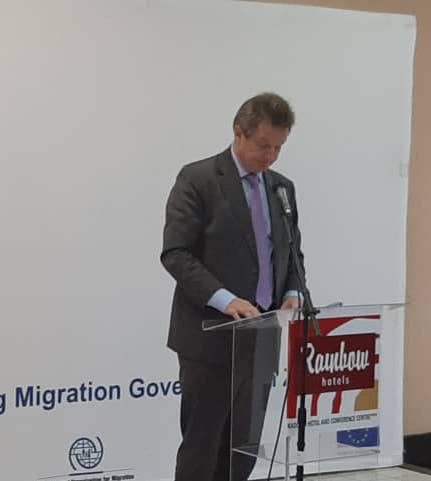Ambassador Timo Olkkonen, the Head of European Union (EU) Delegation to Zimbabwe has underscored the bloc’s commitment towards addressing migration challenges in the country. He was speaking at the ongoing workshop for Parliamentarians in Kadoma on strengthening migration legislation to promote migrant rights.
Migration has become a major feature of the globalised world, impacting on the lives of more and more people. It constitutes important economic, security-related and social issues in both Africa and Europe.
Ambassador Olkkonen said migration has now been integrated in the global development framework of the 2030 United Nations Agenda for Sustainable Development, not as a threat, but as an opportunity. In fact, the Sustainable Development Goal 10 explicitly recognises the positive contribution of migrants for inclusive growth and sustainable development.
In line with SDG target 10.7 on facilitating orderly, safe, regular and responsible migration and mobility of people, the overall aim of the EU development approach on migration, according to Ambassador Olkkonen, is not to try to stop migration. The EU policy aims at addressing the root causes of irregular migration and forced displacement and to strengthen safety and security in the global context emphasising the need to tackle criminal networks of traffickers and smugglers to prevent exploitation of migrants. It provides a comprehensive approach grounded in the respect of the fundamental rights of the migrants.
Although much of the debate is presently focused on migration to the EU, Ambassador Olkkonen said there are solid approaches and interventions to protect the rights of migrants, tackle discrimination and inequalities and promote the positive impact of migration worldwide.
Similarly, the African Union has adopted several legal and policy instruments intended to regulate migration on the continent. As per the 2063 Agenda,
Africa aspires to “be a continent of seamless borders, with free movement of people, that has dynamic and mutually beneficial links with her Diaspora and that has no human trafficking.”
The objectives of Agenda 2063 also envisages the establishment of policies that lead to better and more responsible labour migration flows, including adequate protection of the rights of migrant workers and their families.
“In the Southern African region, the EU works in collaboration with the SADC secretariat and its member states, targeting regulatory frameworks, regional monitoring mechanisms, and the protection of migrant workers and vulnerable migrants.
“Everywhere migration has become an issue of key national interest and Zimbabwe is no exception. At the bilateral level the European Union is providing approximately 3 million Euro for a project “Promoting Migration Governance in Zimbabwe” in cooperation with the International Organisation for Migration,” Ambassador Olkkonen said.
Zimbabwe has over the past two decades witnessed multiple and complex migration flows characterised by high levels of cross-border mobility, brain drain, irregular migration, human trafficking and human smuggling.
In line with the government strategy, the project works on developing policies in three key areas: (i) labour migration, (ii) immigration and (iii) diaspora policy (notably related to the formalisation of remittances). Thus far, the immigration policy is still being developed, while the labour migration policy and the diaspora policy have been developed and adopted although the present cash crisis challenges its implementation.
“The political, economic and legal uncertainty prevailing in the country undermines the inflow of investment not only from the diaspora but from other private investors as well. We therefore strongly urge the Government to maintain on the top of its agenda the implementation of reforms that create an environment conducive to investment and lead to poverty reduction,” Ambassador Olkkonen said.
The EU funded migration programme fits in a broader approach to governance and institutional strengthening agreed with the Government when in early 2015, they signed what the National Indicative Plan which centres on the implementation of the 2013 Constitution. To this end the EU has provided support through a number of projects with different stakeholders, including Parliament, various Ministries and non-state actors.
He emphasised the importance of political will to implement the Constitution.
According to Section 56 of the Constitution, Zimbabweans and non-Zimbabweans alike have the right “not to be treated in an unfairly discriminatory manner on such grounds as their nationality, race, colour, tribe, place of birth, ethnic or social origin, language, class, religious belief, political
affiliation, opinion, custom, culture, sex, gender, marital status, age, pregnancy, disability or economic or social status, or whether they were born in or out of wedlock.”
This places an obligation on the government to ensure that migration is properly managed in a rights-based, migrant-centred and gender sensitive manner.
“It is also of paramount importance to acknowledge that there are migration related laws that are yet to be aligned to the Constitution and to international standards. The Citizenship Act and the Immigration Act remain work in progress since the approval of the principles beginning of last year.
“The Trafficking in Persons (TIP) Act requires further amendment to make it consistent with the 2000 UN TIP Protocol, to which Zimbabwe is party to. The definition of trafficking in the 2014 TIP Act defines trafficking in persons as a movement-based crime and does not adequately define “exploitation” thus providing inadequate protection from the crime of trafficking in persons.”
